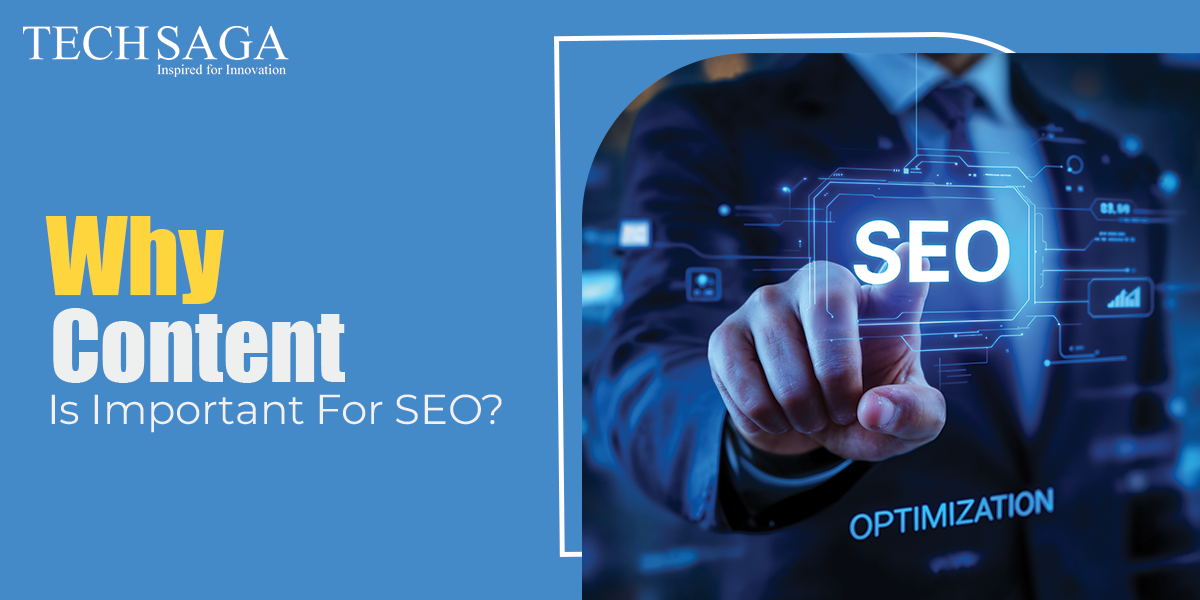Team Techsaga
Gain valuable insights and stay updated with the latest innovations through our engaging blog. Explore trends, technology advancements, and expert opinions to navigate the ever-evolving world of IT.
Why Content Is Important For SEO?
In digital marketing, search engine optimization (SEO) is vital for getting organic traffic to your site. But SEO is not all about technical aspects such as keyword optimization, backlinks, or metadata. Content is one of the most significant factors that play a huge role in SEO success. Quality content isn’t just about having words on a page; it’s about providing value to your audience and aligning your content strategy with search engine algorithms. In this blog, we’ll explore the importance of content for SEO and how it can help your website rank higher in search engine results.
1. Content Aids Search Engines in Understanding Your Site
SEO fundamentally involves assisting search engines, such as Google, in understanding your website’s nature. And they primarily achieve that by crawling and indexing what appears on your pages. The higher the quality of your content, the greater search engines’ chances to comprehend it in the correct sense and position it higher on suitable search pages.
For Example, When you write about the ‘importance of content marketing in digital strategies’, if your content is full of useful keywords and subjects, it leaves search engines in no doubt as to what your page is about. It makes it more likely that your page will be displayed to users searching for information on those keywords. Content is the “bridge” between your website and search engine algorithms that allows you to reach more people.
2. Quality Content Drives Organic Traffic
One of the most significant benefits of content in SEO is its ability to drive organic traffic. Organic traffic refers to the visitors who find your website through search engine results, as opposed to paid ads. When you create content that is well-researched, informative, and valuable, it is more likely to rank higher for relevant queries. Consider this: People go to search engines because they want answers. If your content answers their questions, solves their problems, or provides value, they are more likely to click on your page. When this happens consistently, you’ll build organic traffic that doesn’t rely on costly advertising.
3. Content Establishes Authority and Trust
To search engines, trust and authority are key ranking elements. Well-researched, high-quality, and detailed content that addresses the users’ questions can make your website an authoritative one in your niche. The more helpful and detailed your content is, the greater the chances of search engines classifying your site as a useful source and ranking it higher.
4. Content Enhances User Experience (UX)
User experience is also a very important aspect of SEO rankings, and content has a massive role to play here. Well-written, readable, and interesting content keeps users on your site for longer. The longer users stay on your page, the more it indicates to search engines that your content is useful and relevant to the query. Additionally, the importance of content strategy is not solely in the words. Visual content like images, videos, and infographics enhances user engagement, which makes the experience more interactive and fun.
5. New Content is Rewarded by Search Engines
Search engines such as Google favor sites that update their content regularly and keep it fresh and current. This is especially true for businesses where trends and information are constantly changing. Updating your content regularly not only guarantees that your visitors have the most current information but also informs search engines that your site is active and relevant.
6. Content Facilitates On-Page SEO Optimization
Content is where most of your on-page SEO optimization happens. On-page SEO is about optimizing individual website pages to rank better and gain more relevant traffic. Although many elements play a role in on-page SEO (like meta descriptions, internal linking, and header tags), content is the central pillar.
Using keywords strategically, variations, and long-tail phrases in your content will enhance your prospects of ranking for various search queries. That being said, be careful not to overstuff keywords (a technique referred to as keyword stuffing) because it will invite search engine penalties. The idea is to produce natural, readable content that uses your target keywords naturally.
7. Content Drives Backlinks and Social Media
Great content isn’t just good for SEO—it also can be shared socially. If your audience is helped by your content, they’ll share it with their audience, getting your website seen more and driving traffic to your site. Social signals such as likes and shares can indirectly impact your rankings by getting traffic to your site and creating brand awareness.
In addition, high-quality content has a better chance of getting backlinks. When other sites reference your content, it tells search engines your content is reliable and trustworthy. Backlinks continue to be one of the most powerful ranking factors in SEO.
8. Content Supports Local SEO
If you are a local company with defined geographic areas you target, content is particularly relevant for local SEO. By making location-based content, you can rank higher when people search locally for items and services like yours and nearby. Local SEO is necessary for businesses marketing to consumers within a geographic area, such as a small neighbourhood café, service business, or retail establishment. Unlike classic SEO, which prioritises ranking for broad national search terms, local SEO tries to match businesses with users searching for services, products, or information in a specific location.
Wrap Up
In SEO, the importance of content strategy truly is more than a king—it’s the foundation of any effective SEO campaign. From assisting search engines in understanding your site to engaging with users and establishing authority, content is crucial in driving your search engine rankings and organic traffic. Whether you’re writing blog posts, landing pages, product descriptions, or even multimedia materials, quality and relevance truly matter.
By taking the time and effort to produce useful, optimised content, you not only improve your SEO performance but also your website’s user experience, boost brand visibility, and build trust with your audience. So, remember: when it comes to SEO, content is everything.




